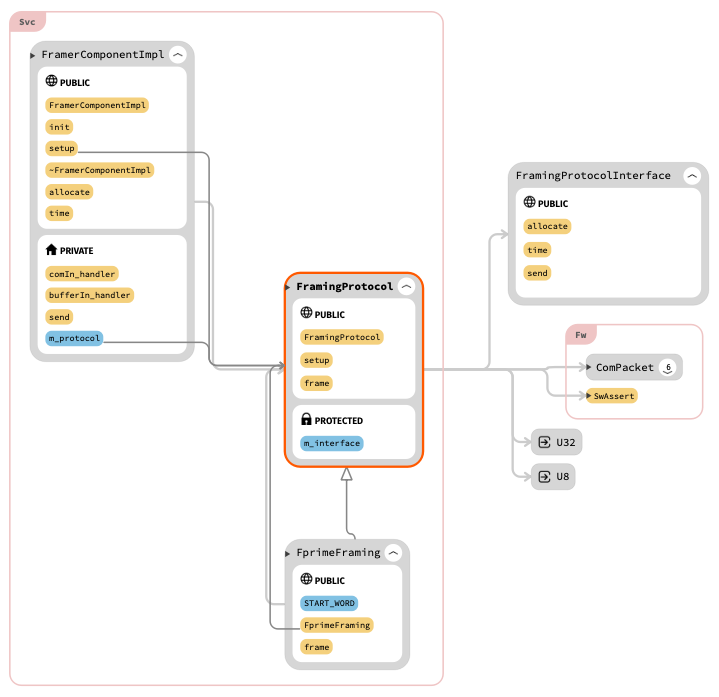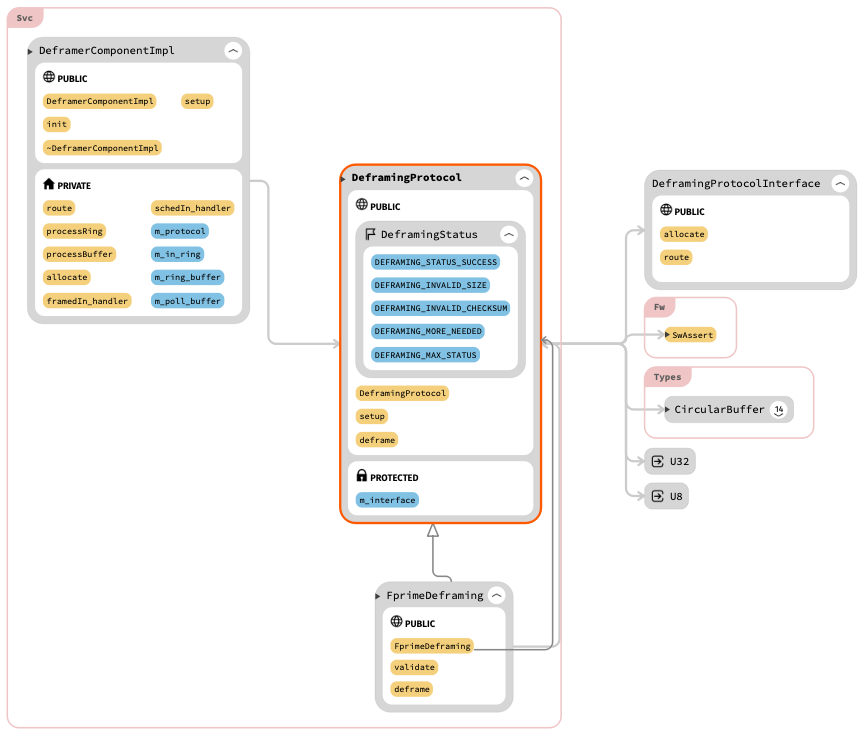 |
F´ Flight Software - C/C++ Documentation
devel
A framework for building embedded system applications to NASA flight quality standards.
|
 |
F´ Flight Software - C/C++ Documentation
devel
A framework for building embedded system applications to NASA flight quality standards.
|
The FramingProtocol library defines the interfaces to the framing and deframing protocols used by the Svc::Framer and Svc::Deframer components. Svc::Framer uses a framing protocol to wrap data in frames for transmission to the ground. Svc::Deframer uses a deframing protocol to extract data from frames received from the ground. The FramingProtocol library allows each of these components to operate with any one of several protocols. Each protocol corresponds to a different implementation of an interface provided by this library.
This library implements default F' protocols that work with the F' Ground Data System (GDS). The F' protocols use the following frame format: frame header, data, hash value. A frame header consists of a four-byte start word 0xDEADBEEF and a four byte data size. The hash value is defined by the Utils::Hash library.
Users may provide new protocols by implementing the abstract classes defined in the FramingProtocol library.
| Requirement | Description | Verification Method |
|---|---|---|
| Svc-FramingProtocol-001 | Svc::FramingProtocol shall provide the interface to a protocol for wrapping data in frames for transmission to the ground | Unit test |
| Svc-FramingProtocol-002 | Svc::FramingProtocol shall provide the interface to a protocol for extracting data from frames received from the ground | Unit test |
| Svc-FramingProtocol-003 | Svc::FramingProtocol shall implement the framing and deframing protocols used by the F Prime GDS | Unit test |
To use the F' framing protocol, do the following:
FprimeFraming defined in this library.Svc::Framer component, passing the instance created in step 1 to its setup method.For an example, see the definition of the instance downlink at Ref/Top/instances.fpp.
To implement and use a new framing protocol, do the following:
FramingProtocolInterface as discussed in Section 3.1. This class defines helper operations used when framing a packet.FramingProtocol as discussed in Section 3.1. This class defines the operation of framing a data packet.setup method.Svc::Framer component, passing the instance created in step 4 to its setup method.To use the F' deframing protocol, do the following:
FprimeDeframing defined in this library.Svc::Deframer component, passing the instance created in step 1 to its setup method.For an example, see the definition of the instance uplink at Ref/Top/instances.fpp.
To implement and use a new deframing protocol, do the following:
DeframingProtocolInterface as discussed in Section 3.2. This class defines helper operations used when deframing a framed packet.DeframingProtocol as discussed in Section 3.2. This class defines the operation of deframing a framed packet.setup method.Svc::Deframer component, passing the instance created in step 4 to its setup method.To implement a framing protocol, do the following:
FramingProtocolInterface.FramingProtocol.Implementations of the framing protocol are allowed to produce zero or one frame for each incoming packet. Producing zero packets is useful when aggregating packets into a larger frame. Producing more than one packet is not permitted.
FramingProtocolInterface defines helper methods for framing data. Typically these methods are implemented by an F Prime component (e.g., Svc::Framer), because they require port invocations. The component Svc::Framer provides an implementation of FramingProtocolInterface that you can use. It does this by inheriting from FramingProtocolInterface and implementing its abstract methods.
To implement FramingProtocolInterface, you must implement the following pure virtual methods:
The method allocate should accept a size in bytes and return an Fw::Buffer that (1) points to a memory allocation of at least that size if the allocation succeeded; or (2) has size zero if the allocation failed. A typical implementation invokes a port connected to a memory allocation component.
The method send should send the data stored in the buffer. A typical implementation invokes an Fw::BufferSend port.
FramingProtocol defines the operation of framing a packet. To implement FramingProtocol, you must implement the following pure virtual method:
This method is called with the following arguments:
data: A pointer to the data to frame.size: The number of bytes to frame.packet_type: The type of data to frame.The abstract class FramingProtocol provides a protected member m_interface. This member is a pointer, initially null. After the setup method of FramingProtocol is called, it points to a concrete instance of FramingProtocolInterface.
Your implementation of frame should do the following:
m_interface->allocate to allocate a buffer to hold the framed data.m_interface->send to send the buffer. m_interface->send should be called at most once in any single invocation of frame. Aggregating protocols may only call m_interface->send for occasional invocations of frame.To implement a deframing protocol, do the following:
DeframingProtocolInterface.DeframingProtocol.DeframingProtocolInterface defines helper methods for deframing data. Typically these methods are implemented by an F Prime component (e.g., Svc::Deframer), because they require port invocations. The component Svc::Deframer provides an implementation of DeframingProtocolInterface that you can use. It does this by inheriting from DeframingProtocolInterface and implementing its abstract methods.
To implement DeframingProtocolInterface, you must implement the following pure virtual methods:
The method allocate should allocate memory, as described in Section 3.1.1.
The method route should send (route) the data stored in the buffer. A typical implementation invokes either an Fw::Com port (e.g., for sending commands) or a Fw::BufferSend port (e.g., for sending file packets).
DeframingProtocol defines the operation of deframing a packet. To implement DeframingProtocol, you must implement the following pure virtual method:
This method is called with the following arguments:
buffer: A circular buffer holding the data to deframe.needed: A reference for returning the number of bytes needed for deframing.deframe returns a value of type DeframingStatus indicating what happened.
The abstract class DeframingProtocol provides a protected member m_interface. It operates as described in Section 3.1.2.
Your implementation of deframe should do the following:
m_interface->allocate to allocate an Fw::Buffer to hold the deframed data.m_interface->route to send the buffer.needed to record the number of bytes needed.The F Prime framing protocol operates as follows:
packet_type is Fw::ComPacket::FW_PACKET_UNKNOWN, then the frame data size is the size of the provided data.The F Prime deframing protocol operates as follows:

Diagram view of DeframingProtocol:

Diagrams generated with SourceTrail
| Date | Description |
|---|---|
| 2021-01-30 | Initial Draft |
| 2021-02-15 | Revised |